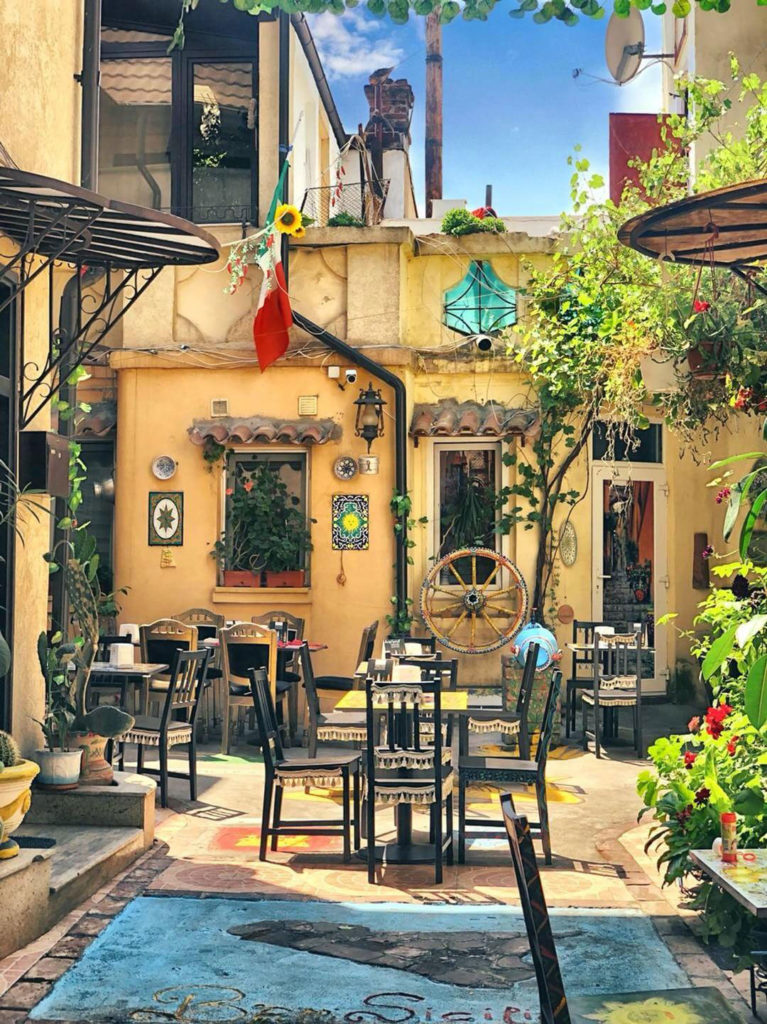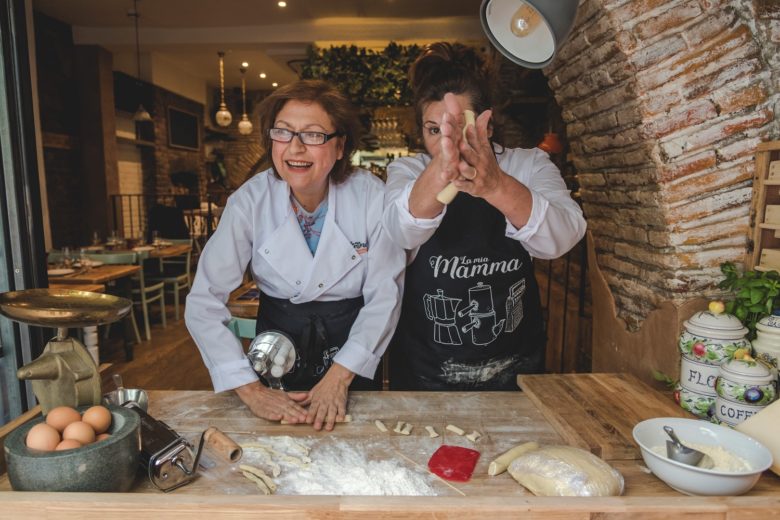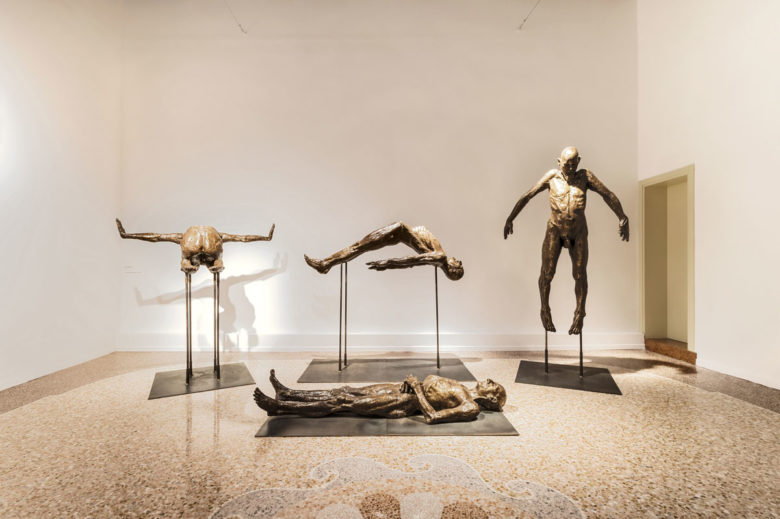Going to Romania on a trip? Meet Domenico and discover his Sicilian cannoli
A country so beautiful and yet little known, if not through second-hand news and many prejudices. It is enough to go there and have this 47-year-old restaurateur and pioneer from Messina as a guide to discover a fascinating and perhaps not so “foreign” land
You are probably asking what you could possibly do once arrived in Romania. And one could answer that its Parliament is the heaviest structure in the world, that it has the largest spas in Europe, the mysterious landscapes of Dracula or many gardens full of lalele, i.e. those tulips sold by some women on the street for a leu (0.21 euros). But the truth is that this destination is chosen because it is cheap. A little time and some talk with a Uber driver would be enough to find out something more about this place: for example, it is not true that singing Dragostea Din Tei or naming Ceausescu is illegal and there is a proverb reading «the best legume is pork». Moreover, Romanians admire Trajan, the emperor of the Urbs Aeterna who made the ancient Dacia a Roman province (a conquest which also coincided with the greatest expansion of Rome). But, above all, if you go there you will learn that Romania vibrates with a desire for redemption and perhaps it is so fascinating since tourists haven’t swarmed it yet. This is confirmed by Amalia and Domenico, a 40-year-old Romanian of Greek descent and a 47-year-old Sicilian from Messina, who have been running the only typical Sicilian restaurant in the heart of Bucharest for 15 years. it is called “Belli Siciliani” and made Domenico be awarded by the Sicilian Region at the Expo 2015 in Milan with the title of ambassador of authentic Sicilian cuisine.
A TOUCH OF SICILY IN MATASARI ROAD. You go there and find an intense smell of coffee and the Italian talk show “Uno Mattina” on TV: this is how Amalia, a former flight attendant, welcomes her guests. She, Domenico and their two children live there and have also created a B&B to extend their typical hospitality to tourists. The two play around in Sicilian dialect, which is well spoken by Amalia too. «I have a degree in foreign languages, but I had to learn the dialect of Messina because, after working for a long time at Catania airport, people in Messina made fun of I my strong cadence. Anyway, I’m a fan of Litterio and Salvo La Rosa and used to watch them on TV, while now I never miss an episode of Detective Montalbano». At their place you really feel in Sicily: from the lava stone tables to the door decorations painted by Sicilian fine arts students, from the typical mappine (rag, in Sicilian dialect) to some paintings and Sicilian carts in the courtyard. The menu in four languages includes some typical southern dishes, from pisci stoccu to missinisi and pasta ca linticchia, from cannoli to frutta martorana, all served with Tomarchio Spuma and Chinotto and with bottles coming from Salina vineyards. “The recipes are from Domenico’s family. His sisters prepare then marinated vegetables and limoncello and send them to us», says Amalia with a pinch of pride for the genuineness of their dishes. “Belli Siciliani” defends the authenticity of local products, such as the aromatic oils served to those who ask for ketchup and above all the real cannolo, whose original recipe they explained in some television programs that made them famous. “Cannoli are a business here, but they fill them with anything: mascarpone, spinach, raisins, explains Domenico while wearing a sweatshirt with Sicily on the left side and a mozzarella on the right. «This is the logo of our cheese factory: it is located about 20 km from here, we built it on three years ago to always count on fresh ricotta and other cheeses. The next step will be to produce arancini on an industrial level: we already have the right machines, but they are not very well known here yet». Their typical clientele? «Mixed but rich. The Romanians appreciate us very much, they even come at 10.30 a.m. to have lunch in peace, because at lunch time there are always tons of people».

LIVING IN THE HAPPY CITY. If someone asks him if he ever thought of returning to Messina, Domenico replies: «And what for? Here the management is difficult from a bureaucratic point of view, but the taxes are 1%, 3% or 16%, depending on the earnings. Opening an activity here is convenient, but you must be present and cannot delegate anyone». The question arises spontaneously: why do people emigrate? «Because Bucharest is a European capital, while outside is another world. Here, if you want to work, there are lots of opportunities, but what is lacking is the shrewdness of learning a job: many do not think that working today as a servant in a pizzeria they could open their own place tomorrow, so they prefer to work somewhere else if the pay is slightly higher. They do not have a long-range perspective» underlines Domenico, not without a little regret for that nation he has learned to love. If you walk in the street you will always feel safe in the city, as you are constantly surrounded by some policemen, but what is shocking is the discrepancy in urban architecture: decrepit buildings coexist with modern structures that seems to be appeared almost from nothing. «Indeed», confirms Domenico. «The dictatorship fell in 1989. From that moment everything has being improving, even if outside the capital the situation is still difficult». He does not stop repeating this last sentence. If you ask him what he thinks is missing in this nation he replies: «It lacks qualified personnel, but the good news is that if you are good you can make a career, there are no recommendations here». What’s more, Bucharest means “happy city”: the hope is that the meaning of this toponym could concern the entire country. The papanasi (some characteristic sweets) and the ie (a typical blouse) depicted in those magnets decorating the fridge of many tourists represent a people with a rich and ancient history, that we should know a little better and with less prejudices.
Translated by Eva Luna Mascolino



